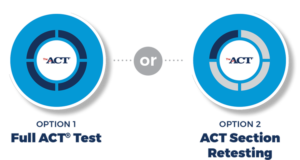We hope you’re staying safe and well. With daily updates and changes on the standardized testing front, we are here to provide the most up-to-date COVID-related news. As always, we want to ensure that you feel supported in the test prep process. At this unprecedented time, having clarity on the when’s, where’s, and how’s of taking your SAT, ACT, or AP exams is essential. Here’s what we know:
ACT Updates:
Though ACT June test dates have not been officially cancelled, there is still a strong likelihood of June cancellations. We recommend that students registered for the June administration utilize the Flexible Scheduling option to change their June test date to July for free. At this time, July seems a safer bet and officially changing your test date may relieve some of the uncertainty-induced stress and allow you to create a more productive test preparation schedule.
Without any formal announcement, ACT has also opened up their July test date to New York state! Currently, there are no available testing sites in NYC, but this could change, so keep an eye on your registration portal.
Looking ahead to the fall, ACT will be offering three previously planned test dates on September 12th, October 24th, and December 12th. While we don’t have full details on timeline yet, ACT will also be unveiling their new at-home digital testing option in the late fall / early winter.
This option would allow students to take the test at home on a computer, which would certainly be a game changer. (This is becoming a trend in the world of standardized testing, check out what we have to say about the new online LSAT.)
In other ACT news, starting in September 2020 students who have already taken the full ACT exam will have the option to retake one or more specific sections of the test. Section retakes will eventually be offered digitally as well, which will be a test-taking timesaver and speed up the wait time for receiving scores.
SAT Updates:
Continue preparing for the August exam! (See our previous post about June cancellations and recommendation.) The College Board plans to provide weekend SAT administrations every month through the end of 2020 beginning in August, public health permitting. This means that students will be able to test on August 29th, September 26th (new!), October 3rd, November 7th, or December 5th. Remember, most colleges will accept scores through the November administration for early applications, so rising seniors still have four remaining opportunities to test.
According to College Board, students will be notified during the week of May 26th about registration for these test dates, but we recommend keeping an eye on your email and the website in case anything changes. Rising seniors without test scores and students registered for June test dates will be granted priority access before registration opens up for everyone else. The College Board will be sending out clarifying information on what that priority access looks like on the week of May 26th, as well.
AP Exam Updates:
AP exams will look very different this year: all exams will be delivered online, to be taken at home. The tests will be limited to 45 minutes and the multiple choice portion of all exams will be eliminated. Additionally, exams will be open note. Check out these tips for success on open note exams and stay tuned for more tips on how to approach the new exam format.
AP exams will be offered May 11th – 22nd, with make-up exams offered June 1st – 5th. Though having more time to prepare for your AP exams may seem appealing, all students should plan to take their tests during the May testing window. If you encounter any issues in May, the June testing window will serve as a contingency plan. No additional make-up dates will be offered, so it is crucial to plan to take your exam(s) in May!
This year, AP exams will only include content that is typically covered by teachers through early March. The College Board assures us that they are committed to upholding the integrity of their AP exams, especially under such unusual circumstances, which will mean extra attention to exam security and fairness. They will be utilizing tools to detect plagiarism and other testing irregularities.
Despite these major changes, the College Board is determined to honor the time and effort that high school students have poured into their AP classes this year. They are enthusiastic that colleges will give credit to students with qualifying 2020 AP scores. Many top colleges including Yale and the UC schools have publicly pledged support for granting 2020 AP credit. Many other colleges, however, are still evaluating how they will handle incoming scores. Because of the changes made this year, it’s possible that there will be no official mandate for schools to offer AP credit. As more colleges comment publicly on the matter and set a precedent, the landscape of 2020 AP credit will become clearer.
We know this testing season holds many unforeseen changes. As always, feel free to reach out if you have any questions or need additional support. At Sentia, we don’t just tutor, we’ll be with you every step of the way™ — especially in such uncertain times.


